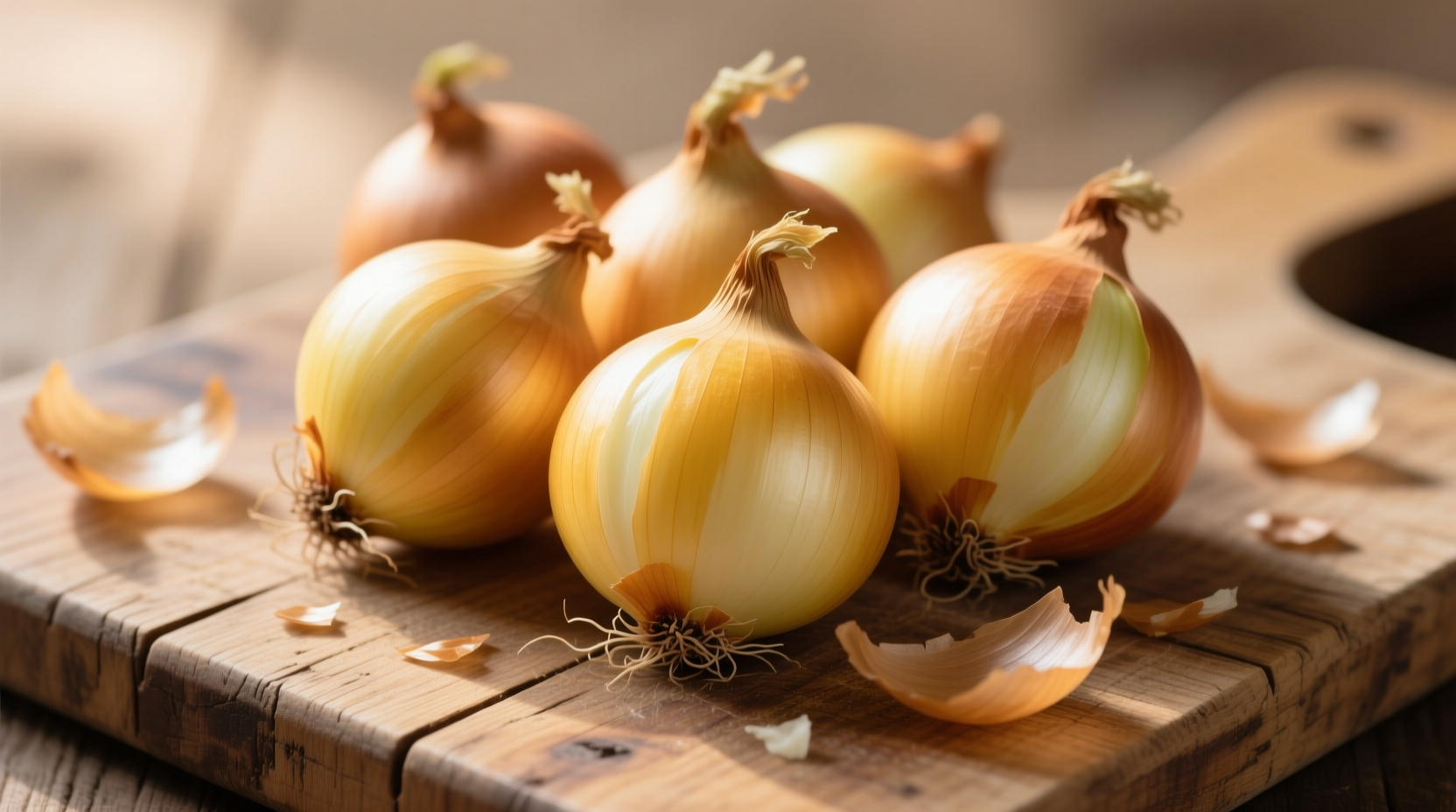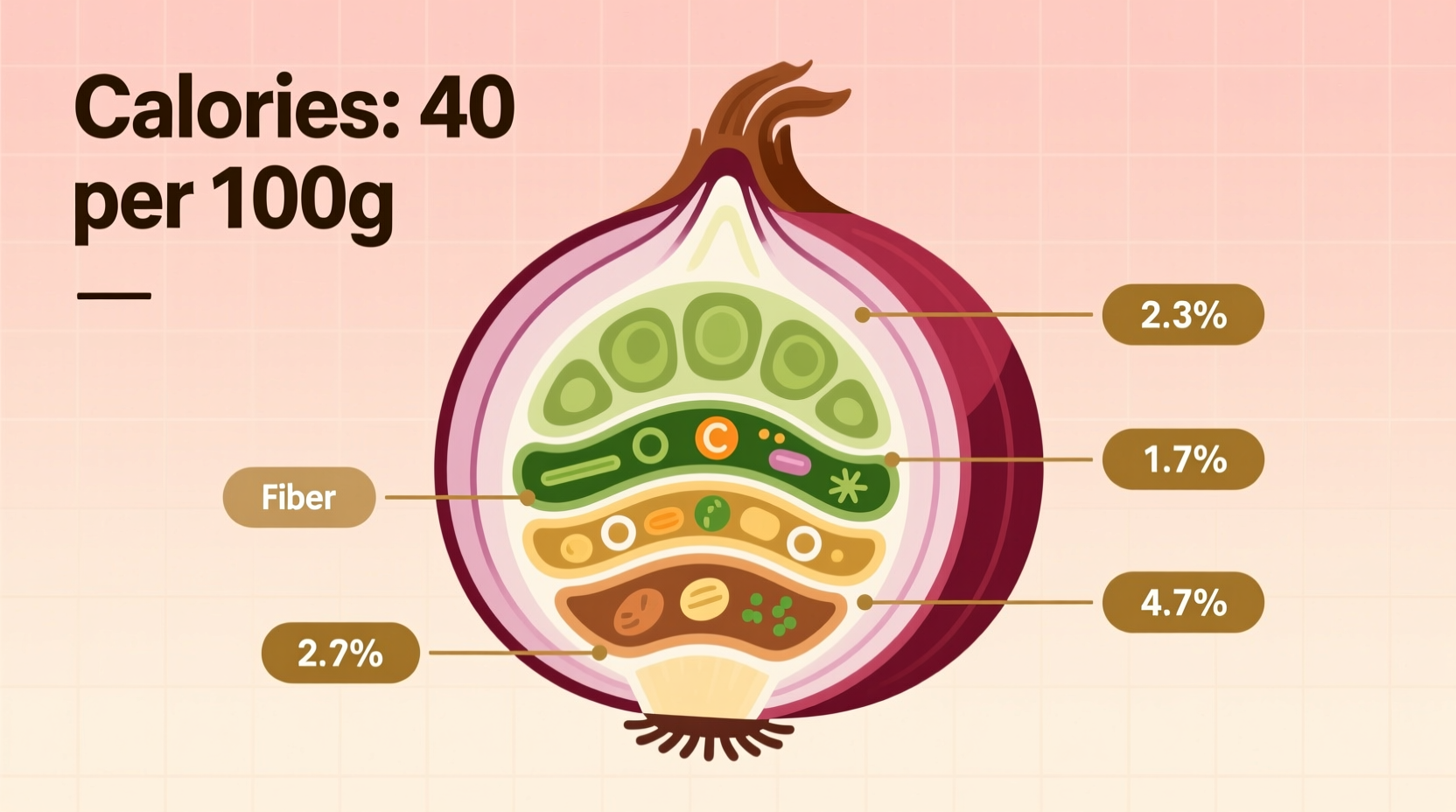Understanding the exact calorie content of onions helps health-conscious cooks and dieters make informed choices without sacrificing flavor. Whether you're meal prepping, tracking macros, or simply curious about this kitchen staple, knowing precise nutritional information transforms how you incorporate onions into your diet.
Onion Nutrition by Size and Type
Not all onions are created equal when it comes to calorie content. The exact count varies based on size and variety. According to USDA FoodData Central, the standard reference for nutritional information, here's what you need to know:
| Onion Type | Size | Weight | Calories | Carbohydrates |
|---|---|---|---|---|
| Yellow onion | Medium | 110g | 44 | 10g |
| Red onion | Medium | 110g | 42 | 9.8g |
| White onion | Medium | 110g | 43 | 10.1g |
| Green onions | 1 cup chopped | 100g | 32 | 7.3g |
| Shallot | 1 ounce | 28g | 26 | 6.3g |
The slight variations between onion types come from differences in water content and natural sugar levels. Red onions typically contain slightly more antioxidants but nearly identical calorie counts compared to yellow onions. This minor difference won't impact your daily calorie tracking significantly, but matters for specific dietary needs.

Breaking Down Onion Nutrition
Beyond basic calories, onions offer impressive nutritional value. A medium onion provides:
- 44 calories with zero fat content
- 10 grams of carbohydrates, including 2 grams of dietary fiber (8% of daily value)
- 9 grams of natural sugars that develop when cooked
- 170 mg of potassium (5% of daily value)
- 11 mg of vitamin C (12% of daily value)
- Trace amounts of calcium, iron, and B vitamins
According to research published in the Journal of Agricultural and Food Chemistry, onions contain over 25 different flavonoids, with quercetin being the most prominent. These compounds contribute to onions' health benefits while adding negligible calories to your diet.
How Cooking Changes Onion Calories
Many home cooks wonder if cooking affects onion calorie content. The answer requires understanding how preparation methods impact nutritional values:
- Raw onions maintain their exact nutritional profile with 44 calories per medium onion
- Sautéed onions increase to approximately 60 calories per medium onion due to oil absorption (1 tsp oil adds 40 calories)
- Caramelized onions concentrate natural sugars, reaching about 55 calories per medium onion without added fats
- Roasted onions retain similar calorie counts to raw when prepared without oil
The National Onion Association confirms that cooking doesn't significantly alter the onion's inherent calorie content—any increase comes from added fats or the concentration of natural sugars during cooking processes.
Practical Applications for Meal Planning
Knowing exact onion calories helps optimize your meal planning. Here's how to leverage this information:
- Flavor without excess calories: Use raw onions in salads and salsas for maximum flavor impact with minimal calorie addition
- Smart substitutions: Replace higher-calorie ingredients with onions in recipes (e.g., use onions instead of cream in soups)
- Portion control: Measure onions when tracking calories—1/4 cup chopped onion equals approximately 16 calories
- Meal prep advantage: Cook large batches of caramelized onions to add flavor to multiple meals throughout the week
Dietitians at the American Heart Association recommend including onions in heart-healthy diets because their low calorie density allows for generous portions while staying within calorie goals. The fiber content also promotes satiety, helping control overall calorie intake.
Health Benefits Beyond Calories
While calorie count matters for weight management, onions offer substantial health benefits that extend far beyond their modest energy contribution:
- Anti-inflammatory properties: The quercetin in onions may reduce inflammation markers according to research from Cornell University
- Blood sugar regulation: Chromium in onions helps improve insulin sensitivity, as documented by the National Institutes of Health
- Digestive health: Onion fiber serves as prebiotic food for beneficial gut bacteria
- Heart health support: Regular onion consumption correlates with improved cholesterol profiles in population studies
The Centers for Disease Control and Prevention (CDC) classifies onions as a non-starchy vegetable, recommending them as part of the 1.5-2 cups of vegetables adults should consume daily for optimal health.
Common Misconceptions About Onion Calories
Several myths persist about onion nutrition that deserve clarification:
- Myth: Cooking dramatically increases onion calories
Fact: Only added fats increase calories—onions themselves maintain similar counts when cooked without oil - Myth: Sweeter onion varieties contain more calories
Fact: Sugar content varies slightly but doesn't significantly impact total calories - Myth: Onions cause weight gain
Fact: Their low calorie density and high fiber content actually support weight management - Myth: All onions have identical nutritional profiles
Fact: While similar, red onions contain more antioxidants while shallots offer more minerals per serving
Registered dietitians consistently emphasize that onions' nutritional benefits far outweigh any minimal calorie concerns, making them valuable for virtually all dietary patterns.
Smart Ways to Include Onions in Your Diet
Maximize both flavor and nutrition by incorporating onions strategically:
- Add raw red onions to salads for color and antioxidant boost
- Use green onions as a garnish to add flavor without significant calorie increase
- Create large-batch caramelized onions to enhance multiple dishes throughout the week
- Substitute half the meat in burgers with finely chopped mushrooms and onions
- Add onions to omelets for flavor complexity with minimal calorie impact
Professional chefs like those at the Culinary Institute of America recommend building flavor foundations with onions rather than relying on higher-calorie ingredients, demonstrating how this humble vegetable can transform healthy cooking.
Frequently Asked Questions
How many calories in a small onion?
A small onion (85g) contains approximately 34 calories, with 8 grams of carbohydrates and 1.6 grams of fiber. This makes small onions ideal for single-serving portions when tracking calorie intake.
Do onions help with weight loss?
Yes, onions support weight loss efforts due to their low calorie density (44 calories per medium onion) and high fiber content. The fiber promotes satiety while the volume allows for generous portions within calorie goals. Research shows that including non-starchy vegetables like onions in meals correlates with better weight management outcomes.
Are cooked onions higher in calories than raw?
Cooked onions have nearly identical calorie counts to raw onions when prepared without added fats. The perceived calorie increase comes from oil absorption during cooking—1 teaspoon of oil adds approximately 40 calories. Caramelized onions concentrate natural sugars but don't significantly increase total calories unless fat is added.
Which onion variety has the fewest calories?
Green onions (scallions) have the lowest calorie count among common onion varieties, with approximately 32 calories per cup (100g). However, the difference between onion types is minimal—yellow, red, and white onions all contain between 42-44 calories for a medium-sized onion (110g).
How do onions compare to other common vegetables for calorie content?
Onions have slightly more calories than some non-starchy vegetables but remain very low-calorie. A medium onion (44 calories) contains more calories than celery (16 calories per cup) but fewer than carrots (52 calories per medium carrot). Compared to starchy vegetables like potatoes (163 calories), onions are significantly lower in calories while providing similar flavor enhancement.











 浙公网安备
33010002000092号
浙公网安备
33010002000092号 浙B2-20120091-4
浙B2-20120091-4